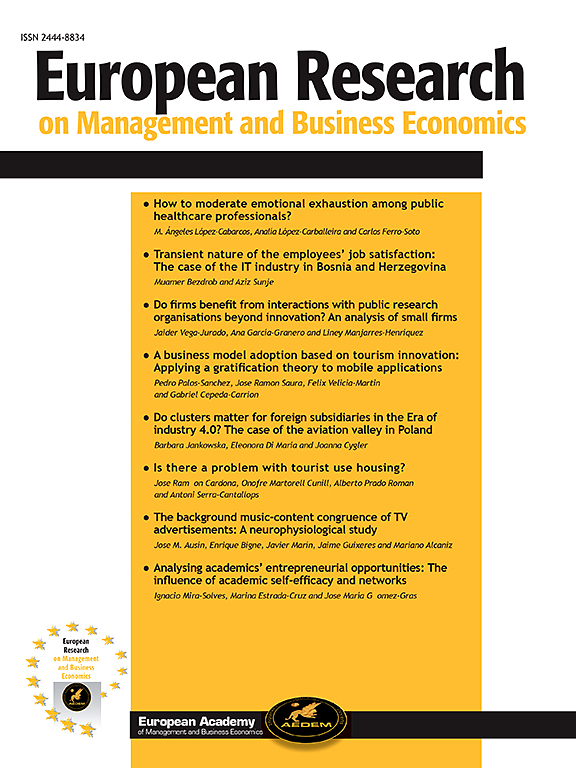The association between technology group, working from home behaviour and preferred communication tools in disruptive times: A micro and small enterprise perspective
IF 6.4
3区 管理学
Q1 BUSINESS
European Research on Management and Business Economics
Pub Date : 2025-04-25
DOI:10.1016/j.iedeen.2025.100280
引用次数: 0
Abstract
This study explores how the adoption of digital technologies has influenced working from home (WFH) practices and the use of communication tools during disruptive times. Focusing on micro and small enterprises (MSEs), this pooled cross section research includes three survey investigations. The first two were conducted during the COVID-19 pandemic in Switzerland in 2020 and 2021. The third was conducted after the pandemic in 2022. Over these three phases, >1500 MSE managing directors were surveyed using the Computer-Assisted Telephone Interviewing (CATI) technique. Inferential statistical analyses revealed that technological pioneers implemented more WFH arrangements than either early or late followers. Similarly, pioneers and early followers utilised Information and Communication Technologies (ICTs) more extensively than late followers, who, in some cases, demonstrated considerable adaptability in embracing digital transformation. Overall, WFH opportunities across all three technology groups (pioneers, early followers, and late followers) remained higher than before the pandemic. This study advances the often-overlooked MSE literature by demonstrating the association between WFH and digital transformation through ICT across the three technology groups. Methodologically, the novel ‘Digital Communication Score’ was introduced, determining the extent to which an MSE utilises various communication tools. Practical implications highlight the need for MSEs to develop digital roadmaps, which include the systematic adoption of appropriate online communication tools, in order to prepare for future disruptions. This will require implementing conduct standards and, ultimately, policies aligned with developing digital capabilities to ensure employee satisfaction and motivation, leading to greater overall success.
颠覆时代科技集团、在家工作行为与首选通信工具之间的关系:一个微型和小型企业的视角
本研究探讨了数字技术的采用如何影响在家工作(WFH)的做法以及在混乱时期通信工具的使用。本研究以微型和小型企业(MSE)为重点,包括三项调查研究。前两项调查是在 2020 年和 2021 年 COVID-19 大流行期间在瑞士进行的。第三次调查于 2022 年大流行结束后进行。在这三个阶段中,使用计算机辅助电话访问(CATI)技术对 1500 名 MSE 总经理进行了调查。推理统计分析显示,技术先行者比早期或后期追随者实施了更多的全职工作安排。同样,先行者和早期追随者比晚期追随者更广泛地利用信息和通信技术(ICTs),在某些情况下,他们在拥抱数字化转型方面表现出相当强的适应性。总体而言,所有三个技术组(先行者、早期追随者和后期追随者)的全职工作机会仍然高于大流行之前。本研究通过展示三个技术组的 WFH 与通过信息和通信技术进行数字化转型之间的关联,推进了经常被忽视的 MSE 文献。在方法论上,引入了新颖的 "数字通信评分",以确定 MSE 利用各种通信工具的程度。实际影响强调,微型企业需要制定数字化路线图,其中包括系统地采用适当的在线通信工具,以便为未来的干扰做好准备。这就需要实施行为标准,并最终制定与发展数字能力相一致的政策,以确保员工的满意度和积极性,从而取得更大的整体成功。
本文章由计算机程序翻译,如有差异,请以英文原文为准。
求助全文
约1分钟内获得全文
求助全文
来源期刊
CiteScore
11.70
自引率
3.40%
发文量
30
审稿时长
50 weeks
期刊介绍:
European Research on Management and Business Economics (ERMBE) was born in 1995 as Investigaciones Europeas de Dirección y Economía de la Empresa (IEDEE). The journal is published by the European Academy of Management and Business Economics (AEDEM) under this new title since 2016, it was indexed in SCOPUS in 2012 and in Thomson Reuters Emerging Sources Citation Index in 2015. From the beginning, the aim of the Journal is to foster academic research by publishing original research articles that meet the highest analytical standards, and provide new insights that contribute and spread the business management knowledge

 求助内容:
求助内容: 应助结果提醒方式:
应助结果提醒方式:


